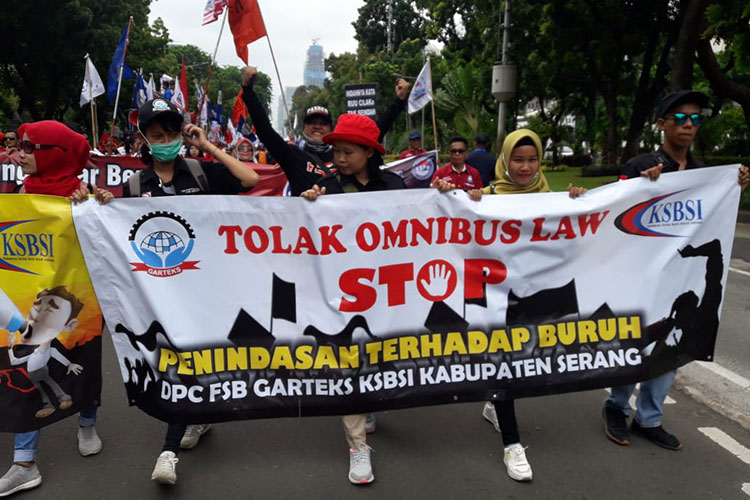By Rekson Silaban, International Secretariat, KSBSI
The Indonesian Trade Union Confederation (KSBSI) took part in the massive protests that gathered over ten thousand workers outside the country’s presidential palace on 15 January 2020. They were denouncing the government’s plans to reform the labour market by undermining workers’ rights.
“We stand against the draft bill because it has been drafted without any consultation with trade unions and it’s aiming at increasing Indonesia’s labour market flexibility to attract more investors at a hight cost for workers. We see a clear attack on workers’ rights and decent work in the country,” said Elly Rosita, President of the KSBSI.
In mid February 2020, the government submitted the omnibus bill draft to the House of Representatives to begin deliberations. While few details have been officially announced, bits of information about what might be included in the labour reform bill have leaked out on the Internet.
According to those, the government has planned for labour market flexibility by allowing hourly pay, decreasing severance pay, liberalising flexible-hours work, lowering minimum wages as well as making it easier to hire and fire workers.
KSBSI suspects that the omnibus bill will bring about a flexible labour market that will deprive workers of their basic rights, including their right to social protection, making them more vulnerable to lay-offs and outsourcing.
Such a labour market reform will have consequences beyond the world of labour and impact the Indonesia’s progression towards sustainable development.
“You can’t achieve sustainable development by focusing only on the economy. Sustainability needs to keep a balance between its three fundamental components: social, economy and environment. This bill is a clear attack on SDG 8 on decent work and sustainable growth, and hence on the whole 2030 Agenda,” said Rekson Silaban (KSBSI’s International Department).
Dancing to the tunes of the World Bank
The reason behind this reform lies in the ambition of Indonesia’s President, Joko Widodo, to improve Indonesia’s rank in the World Bank’s ease of doing business index from current 73rd place (between Luxembourg and Costa Rica) to rank 40th by 2024.
To achieve this goal, Indonesia must revoke around seventy regulations and put them under one law, the so-called omnibus law. The law aims at removing regulations on a minimum standard salary and severance pay. It lifts restrictions to outsource workers and scraps legal sanctions over irresponsible employers. And jeopardises workers’ rights to social security.
As a result of KSBSI’s pressure on the government, the Coordinating Minister for Economic Affairs, Airlangga Hartarto, invited Elly Rosita, along with other stakeholders, to meet. The government offered the KSBSI and other trade unions to integrate the team formulating the law. But the government decided to submit the draft of the bill to the Parliament before the work of the team even started. In response, trade unions decided to resign from the formulating team and to work directly with the Parliament instead. Unions have already started to meet with Members of the Parliament.
Photo: Workers of FSB Gartek /KSBSI marching against the Omnibus Law Source: FSB Gartek.


